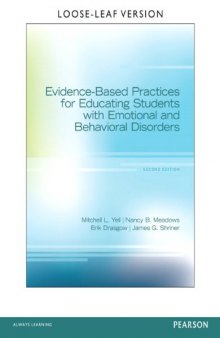 جزییات کتاب
جزییات کتاب
This new text for Emotional and Behavioral Disorder Methods courses aids its readers to become the most effective teachers of students with emotional and behavioral disorders (EBD). The authors demonstrate how using only evidence-based educational practices will enable students with emotional and behavioral disorders to succeed in the classroom, becoming the best version of themselves. The text is a "how-to" for future teachers on planning, organizing, delivering individualized academic and behavior programming, and collecting data on their student's actual performance in the classroom to inform their future teaching and classroom decisions, all for the benefit of the EBD students they are privileged to teach.Highlights of this First Edition...An overview of the foundations of the field of Emotional and Behavioral Disorders equips students with the necessary background of the disorders to prepare them for the remaining content in the text and the experiences they will encounter in their future classrooms and work with EBD students. Content coverage in this section includes: the characteristics of students with EBD, assessment, the law, applied behavior analysis, positive behavior support, cognitive behavioral intentions, and social skills training.Coverage of what it means to use evidence-based practices and strategies for behavior managementwill help readers understand and learn to implement these techniques for classroom success.Discussion of the best academic interventions for students with EBD helps readers review the principles of effective instruction and gain knowledge of the most current research in the field of EBD. The authors emphasize the underlying focus of how important it is for teachers to plan instruction and to collect individual data for monitoring each students' progress in the classroom.Throughout the text, readers will learn how the law affects and influences teaching strategy, aiding reader understanding that implementing only the best classroom practices, strategies, and procedures supported by current research is mandated by legislation, specifically "No Child Left Behind" and the "Individuals with Disabilities Act."



 دانلود کتاب
دانلود کتاب

 جزییات کتاب
جزییات کتاب





 این کتاب رو مطالعه کردید؟ نظر شما چیست؟
این کتاب رو مطالعه کردید؟ نظر شما چیست؟
